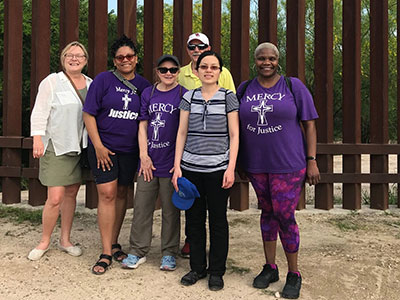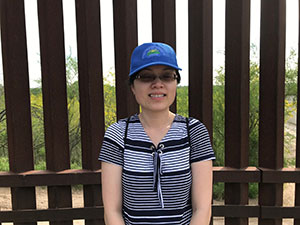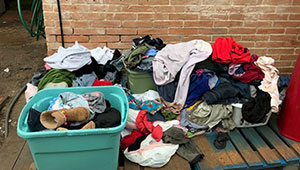‘A profound experience’
 Border Witness delegates from the Sisters of Mercy-South Central Community at the border wall in Hidalgo, Texas: (from left) Buff Easterly, who teaches theology at Mount St. Mary Academy in Little Rock, Ark.; Ty Barnes, director of association for the community; Beth Thompson, writer/editor in the community’s Communications Department; Jack Bartley, COO/CFO for the community; Sister Phuong Dong, who ministers at Holy Angels in Belmont; and Tanya Pitts, a pre-associate and staff member in archives and association. (Photo provided by Beth Thompson)BELMONT — Local Sisters of Mercy leaders witnessed first-hand what those crossing the border from Mexico to the United States experience during a “Border Immersion” program in McAllen, Texas, earlier this month.
Border Witness delegates from the Sisters of Mercy-South Central Community at the border wall in Hidalgo, Texas: (from left) Buff Easterly, who teaches theology at Mount St. Mary Academy in Little Rock, Ark.; Ty Barnes, director of association for the community; Beth Thompson, writer/editor in the community’s Communications Department; Jack Bartley, COO/CFO for the community; Sister Phuong Dong, who ministers at Holy Angels in Belmont; and Tanya Pitts, a pre-associate and staff member in archives and association. (Photo provided by Beth Thompson)BELMONT — Local Sisters of Mercy leaders witnessed first-hand what those crossing the border from Mexico to the United States experience during a “Border Immersion” program in McAllen, Texas, earlier this month.
The goal of these intensive trips is to create “Border Witnesses” who can share first-hand knowledge on the plight of immigrants at the U.S.-Mexican border and expand on the immigration headlines, which don’t always tell the whole story, said Beth Thompson, writer/editor for the Sisters of Mercy’s communications department, who attended the March 31-April 4 trip.
“Our goal is to change the narrative from blaming the victim to addressing root causes of migration,” Thompson said.
Sister Phuong Dong, who ministers at Holy Angels in Belmont, said she was hesitant to travel to the border after hearing stories about criminals and criminal activity that occurs there.
“That’s a fear a lot of people have,” Sister Phuong said. “I felt the need to see it for myself. It was an emotional experience to be with the people and to see and hear what they have to go through. My heart’s been touched.”
Sister Phuong said Border Witnessing took her out of her comfort zone, but she felt safe among the people seeking a better life and she appreciated hearing their stories.
The delegation included five Charlotte-area residents: Sister Phuong, Thompson, Ty Barnes, director of association for the community; Jack Bartley, COO/CFO for the community; and Tanya Pitts, a pre-associate and staff member in archives and association.
They spent time at ARISE, a comprehensive ministry serving women and their families in four immigrant communities “colonias” in South Texas. ARISE is a ministry co-sponsored by the Sisters of Mercy and the Sisters of Charity of the Incarnate Word.
The delegation also met with border patrol agents and an attorney about civil rights, learned about a housing project with “sweat equity,” toured a facility for teens who have crossed the border without an adult guardian, visited the Respite Center, and crossed the border themselves.
That’s the part of the trip that made the biggest impact on Barnes, she said: visiting these “colonias” and hearing the stories of those hoping to receive asylum in the U.S.
“We heard about an 80-year-old man who has a work visa. He gets paid $3 per 100 bunches to pick cilantro,” Barnes said. “That was so shocking to me to learn we are still paying people so little money in this country for such labor-intensive work. He would work sun-up to sun-down and sometimes only make $40 that day.
“Coming home and seeing cilantro in the grocery store – it’s had an impact to understand what it took for that cilantro to make it our grocery store shelf.”
Barnes said she went on the trip in hopes of being a voice in sharing an authentic narrative about the migrants crossing into the United States.
“I think the media has done a good job of portraying people who are crossing the border as criminals,” Barnes said. “Most are just seeking a better way of life, and it is their legal right to do so. There are a lot of misconceptions about those seeking asylum in our country. As Americans, I think we need to honor what we agreed to instead of criminalizing what we agreed to.”
 As a Christian, Barnes said she believes we have to see the human dignity in people first. “We have to be more understanding of the realities on the border. We have to be the voice for people who don’t have one.
As a Christian, Barnes said she believes we have to see the human dignity in people first. “We have to be more understanding of the realities on the border. We have to be the voice for people who don’t have one.
The delegation met with the Rio Grande Border Patrol as well, and they saw the statistics.
“In those legally versus criminally crossing, there’s a huge disparity. But what’s being reported is the negative. When you meet and talk with these people, they’re good people. They don’t have criminal records. They’re trying to get here to have a better way of living,” Barnes explained.
Drug smuggling at the border is on the decline, Thompson said they learned, because illegal trafficking and sales of human organs have become more lucrative.
The group also visited the Catholic Charities-run Respite Center in McAllen, Texas, where asylum-seekers can shower and receive clean clothes, food and rest before traveling to their new homes.
For a facility that sees hundreds of people each day, Thompson said, the Respite Center was quiet and calm.
“It was all a profound experience,” Thompson said. “For me visiting the Respite Center up close had the biggest impact. Just to look into their faces – they’re the lucky ones. They’ve gotten that far and have somewhere to go in the U.S.
“It’s heartbreaking and frustrating how long and hard it can be for them to reach the point where they are here. And it’s clear our immigration system is broken and needs to be fixed. These people need our compassion and not our scorn. We need to instead address the root causes of the migration.”
The group from Charlotte was one of two delegations from the Sisters of Mercy to take part in the border experience this month. The Sisters of Mercy have sponsored a series of visits to the U.S.-Mexico border over the past several years to bring attention to the root causes driving migration from Central America, and the difficult conditions endured by migrants inside the U.S.
— Kimberly Bender, online reporter
Want to get involved?
At www.sistersofmercy.org: Contact the Sisters of Mercy to discover what the current needs are at the U.S.-Mexican border and how you can get involved



